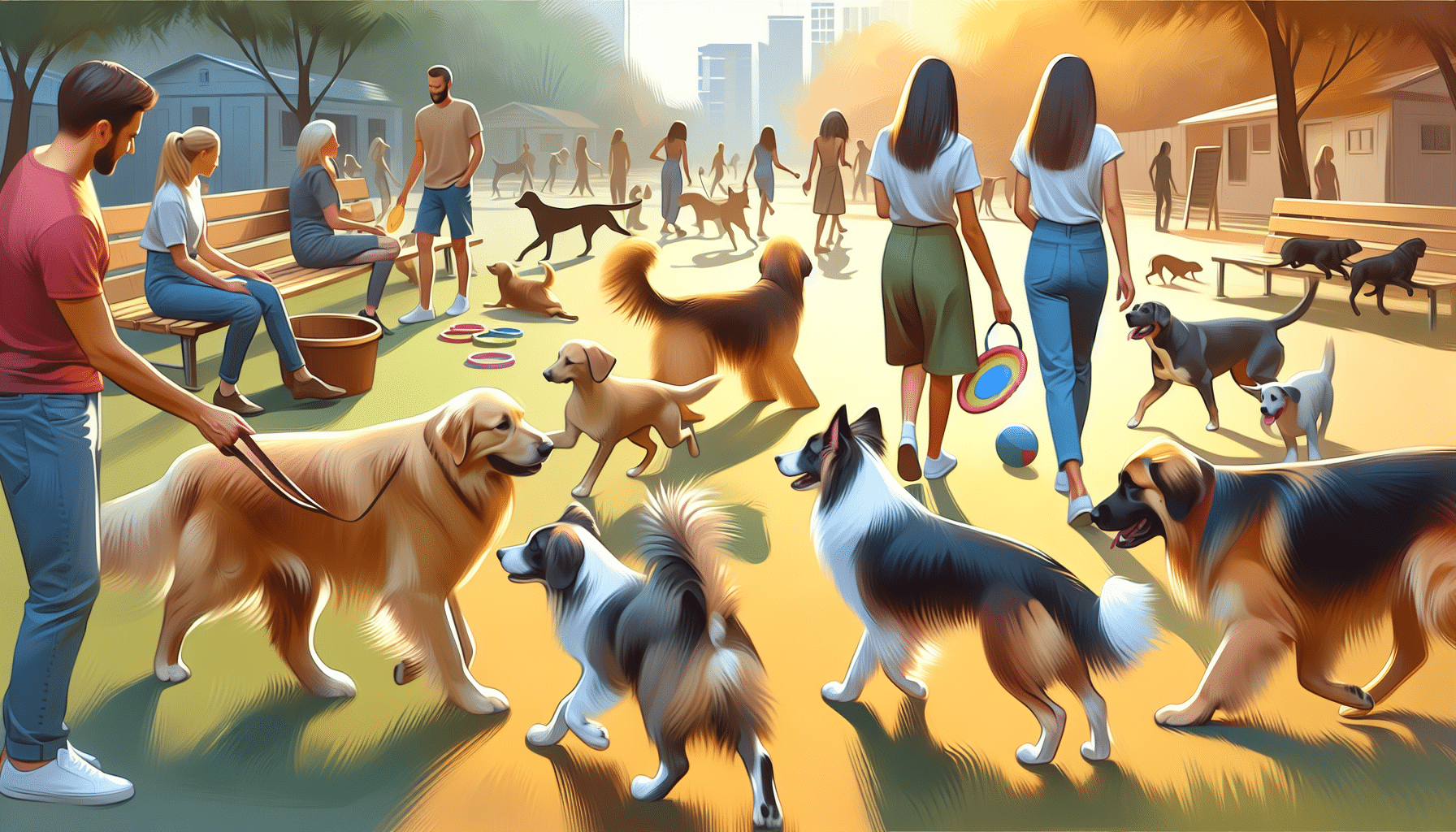Imagine a world without doggy playdates or trips to the local dog park - a world where our furry friends roam alone, missing out on the invaluable benefits of socialization. In "The Importance of Dog Socialization: Playdates, Dog Parks, and More," we'll explore why socializing our canine companions is not only crucial for their overall well-being, but also for building stronger bonds between dogs and their human families. Join us as we dive into the fascinating world of canine socialization and discover the endless possibilities it holds for our four-legged friends.
The Importance of Dog Socialization: Playdates, Dog Parks, and More

This image is property of images.pexels.com.
Understanding Dog Socialization
Dog socialization refers to the process of introducing your dog to different experiences, environments, and individuals, both canine and human, to help them develop into well-rounded and confident members of society. This essential aspect of a dog's upbringing plays a significant role in their overall behavior, mental well-being, and ability to navigate the world around them. By exposing your dog to various social interactions, you are providing them with the necessary stimulation and skills they need to thrive.

This image is property of images.pexels.com.
Benefits of Dog Socialization
Socializing your dog offers a multitude of benefits that contribute to their mental and emotional development. Let's explore some of these advantages:
1. Mental Stimulation
Just like humans, dogs thrive on mental stimulation. Socialization introduces them to novel experiences, scents, sights, and sounds, which help keep their minds active and engaged. By engaging in different social activities, such as playdates and visits to dog parks, your furry friend is constantly exposed to new stimuli, leading to increased mental agility and attentiveness.
2. Development of Social Skills
By socializing your dog, you are providing them with the opportunity to develop essential social skills and learn appropriate behaviors when interacting with other dogs and humans. Through positive interactions, dogs learn how to communicate effectively, read body language, and understand social cues. These skills are crucial for fostering healthy relationships and preventing aggressive or fearful behavior in social situations.
3. Reduction of Behavioral Problems
Proper socialization helps prevent and reduce behavioral problems in dogs. Dogs that have not been sufficiently socialized are more likely to exhibit fear, anxiety, or aggression towards other dogs or humans. By exposing your dog to various social settings and experiences, you help them become more confident and less prone to developing behavior issues, such as excessive barking, destructive chewing, or separation anxiety.
4. Increased Confidence
Socialization promotes self-confidence in dogs, enabling them to feel secure and at ease in different environments. Dogs that are well-socialized are more likely to handle stressful or unfamiliar situations with composure and adaptability. This confidence is invaluable when navigating the world, encountering new people, or facing potential challenges, allowing your dog to lead a happier, more balanced life.

This image is property of images.pexels.com.
Different Ways to Socialize Your Dog
There are various avenues through which you can socialize your dog. Here are some effective methods:
1. Playdates with Other Dogs
Playdates with other dogs are an excellent way to expose your pet to different canine temperaments, sizes, and play styles. These interactions provide an opportunity for your dog to learn appropriate social behavior, engage in play, and practice sharing space and resources. When arranging playdates, keep the following factors in mind.
1.1. Choosing the Right Playmate
When selecting a playmate for your dog, consider their size, energy level, and temperament. It is vital to find a companion that matches your dog's personality and play preferences to ensure a harmonious interaction.
1.2. Supervision and Safety
Always supervise the playdate to intervene if necessary and prevent any potentially dangerous situations. Make sure the location is secure and free from hazards, such as harmful plants or objects that can pose a threat to the dogs' safety.
1.3. Structured Play
Encourage structured play and redirect any inappropriate behaviors, such as rough play or resource guarding. Use positive reinforcement and rewards to reinforce desirable behaviors, such as sharing toys or taking turns during play.
2. Dog Parks
Dog parks provide an excellent opportunity for your furry friend to socialize in a controlled environment. Here are some advantages of visiting dog parks:
2.1. Advantages of Dog Parks
Dog parks offer a spacious and designated area for dogs to run, play, and interact with other dogs. The environment allows for off-leash play, enabling dogs to engage freely and enhance their social skills. Additionally, dog parks often have agility equipment and obstacles, providing mental and physical stimulation for your pet.
2.2. Etiquette and Rules
Before visiting a dog park, familiarize yourself with the specific rules and regulations of the park. Ensure your dog is up to date on vaccinations, spayed or neutered, and comfortable being around other dogs. It is important to monitor your dog's behavior and intervene if any signs of aggression or distress occur.
3. Dog-Friendly Events
Attending dog-friendly events offers a unique opportunity for your dog to socialize and engage with a diverse group of people and other dogs. Consider the following types of events to enhance your dog's socialization experiences:
3.1. Community Gatherings and Meetups
Local community gatherings or meetups specifically designed for dog owners provide a supportive environment for dogs to interact and for owners to share experiences and tips. These events often include informal play sessions, training demonstrations, or educational talks, fostering a sense of community among dog lovers.
3.2. Training Classes and Workshops
Enrolling your dog in training classes or workshops not only provides them with essential obedience training but also allows them to socialize in a controlled and supervised setting. Training classes often involve interactions with other dogs and humans, helping your dog build confidence and learn proper behavior.
4. Socialization with People
Socializing your dog with people is as crucial as their interactions with other dogs. Here's how you can help your dog become comfortable around various individuals:
4.1. Exposure to Different Age Groups
Expose your dog to individuals of different age groups, including children, teenagers, adults, and seniors. This exposure helps your dog become accustomed to various human behaviors, voices, and movements, promoting tolerance and understanding.
4.2. Meeting New Individuals
Regularly introduce your dog to new people in a positive and controlled environment. Encourage these interactions through treats, praise, and gentle handling. Gradually increase the level of stimuli to ensure your dog remains comfortable and confident in new social situations.
4.3. Positive Reinforcement and Calmness
During social interactions, use positive reinforcement techniques to reward your dog for calm and relaxed behavior. This approach helps them associate social situations with positive experiences, encouraging them to be more open and friendly in the future.

Challenges and Precautions in Dog Socialization
While dog socialization brings numerous benefits, it is important to be aware of and address potential challenges. Here are some common issues to consider:
1. Fear and Anxiety
Some dogs may exhibit fear or anxiety in certain social situations, hindering their ability to socialize effectively. To address these challenges:
1.1. Gradual Exposure and Desensitization
Expose your dog gradually to the triggers that elicit fear or anxiety. Start with small doses of exposure and gradually increase the duration and intensity, rewarding calm behavior along the way. This process allows your dog to become more comfortable and desensitized over time.
1.2. Professional Assistance
In severe cases, seek guidance from a professional dog trainer or behaviorist who specializes in fear and anxiety management. They can provide personalized strategies and techniques to help your dog overcome their fears and socialize more confidently.
2. Aggression and Dominance
Addressing aggression and dominance issues is crucial to ensure safe and enjoyable social interactions. Consider the following steps:
2.1. Identifying Triggers and Warning Signs
Carefully observe your dog's body language and behavior to identify triggers and warning signs of aggression or dominance. By understanding these cues, you can intervene before a situation escalates and take appropriate measures to prevent aggressive behavior.
2.2. Behavioral Training and Modification
Enlist the help of a professional dog trainer or behaviorist to develop a personalized training plan. This plan may include reward-based training techniques, positive reinforcement, and behavior modification exercises to address underlying aggression or dominance issues.
3. Health Considerations
When socializing your dog, it is essential to prioritize their health and well-being. Consider the following health-related precautions:
3.1. Vaccinations and Preventative Measures
Ensure that your dog is up to date on their vaccinations to protect them from contagious diseases commonly found in social settings. Consult your veterinarian regarding appropriate vaccinations and preventative measures, such as flea and tick control.
3.2. Parasite Control
Regularly check your dog for ticks, fleas, or other parasites before socializing them with other dogs. Ensure they are protected with appropriate parasite control products to prevent infestations and the transmission of diseases.

Conclusion
Socializing your dog is vital for their mental well-being, behavioral development, and overall happiness. Through various socialization avenues, such as playdates, dog parks, and social events, you can provide your furry friend with enriching experiences that promote confidence, social skills, and a positive outlook on the world. Remember to address any challenges or concerns that may arise during the socialization process, seeking professional assistance if needed. By ensuring your dog is well-socialized, you are setting them up for a fulfilling and harmonious life as a valued member of your community.


